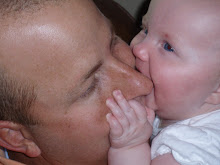Ok, for the three of you who have thrown your thoughts into the mix, I really appreciate it. TJ, Anna, and Alex, you are making connections to this text that are eye-opening for me and allow me to think about the novel from a perspective I hadn't considered in some respects. Reading your posts get me giddy for the start of school. Perhaps others will now feel comfortable tossing their opinions out there as well. You'll hear me say this probably a hundred times throughout the year, but the success of our class is dependent on the number of voices we hear from. If we rely solely on Anna, Alex, or TJ to lead us, no matter how 'right' they are, we're only going to experience literature from their perspective. For this class to truly be an experience we need to debate, gossip, dissect, and theorize. But we need multiple angles of thought to choose from.
So hopefully people have gotten their books and have started reading by now. If you haven't, um, well, okay. Enjoy your next few weeks holed up with a great Russian author.
In any event, I've included a few questions from Part Two of the novel that I think may help with your thought process while reading. Again, feel free to expound upon any or all of the questions below.
1) What does Raskolnikov gain from getting rid of the stolen goods from the pawnbroker? By the end of Part Two we know he didn't steal that much money based on what the police found in her apartment, so why does he hang on to the trinkets that are only of minimal value anyway?
2) Why is Raskolnikov so against Pyotr Luzhin from the beginning he meets him? What is he so leery about? He hardly knows anything about the man, why is he not good enough for Raskolnikov's sister?
3) In the sixth section of Part Two (pg. 158 in my version), Raskolnikov gives a long quote, "a man condemned to death ... if he had to live somewhere high up on a cliffside, on a narrow ledge ... with the ocean, eternal darkness, eternal solitude ... and had to stay like that, on a square foot of space, an entire lifetime ... it would be better to live so than to die right now! To live, no matter how -- only to live! Man is a scoundrel!" Besides seeing that reoccurring reference to man being a scoundrel (like the question in part one that I asked about) it seems Raskolnikov really values life and that survival is key. And yet in his conversation with Zamyotov in the sixth section he basically confesses to the murder. WHY would he do such a thing? What could he possibly gain by acting like this?
**And just as a special aside, pay attention to all of those religious type clues. At some points I feel the novel is very blatant about them. Also, this section seemed pretty big on making metaphorical references to the exterior not being equal to the interior. Seems like a person's character cannot be defined by their outward appearance or behavior. Perhaps that's important to knowing what Dostoyevsky is trying to say with this novel?**








